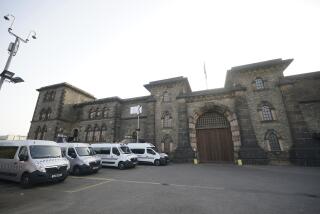British Police Hold Bomb-Plot Suspect
- Share via
BIRMINGHAM, England — Police captured a fugitive suspected of trying to bomb a London subway train, shooting him with a stun gun in a predawn raid Wednesday as a nationwide manhunt for three more would-be bombers gathered speed.
The arrest of Yasin Hassan Omar came as U.S. officials said Zambia had detained Haroon Rashid Aswat, who was sought in connection with earlier transit bombings that killed 52 people in London.
Aswat, 30, a British citizen of Indian descent, piqued the interest of investigators when they discovered that about 20 calls had been placed from his cellphone to some of the men who set off the July 7 bombs.
Investigators are studying possible links between the July 7 blasts and the botched bombings last week.
The capture of Omar at a town house in a Birmingham public housing complex was accompanied by three other arrests in another raid in the city, authorities said. But the trio arrested in the second raid did not appear to be the other suspects. Police also searched an area in London near an apartment where Omar, a 24-year-old Somali immigrant, lived and allegedly plotted last week’s failed attacks on London’s transport system.
Omar was arrested in this industrial city northwest of London in a working-class complex whose population is a mix of South Asian and African immigrants and British retirees, authorities said.
“This is of course an important development,” said Peter Clarke, deputy assistant commissioner of the Metropolitan Police. “However, I must stress how important it is for the public to remain watchful and alert. We are still looking for the other three men whose pictures we have released and who we believe tried to set off bombs on 21st July.”
The raid in a cul-de-sac in the Hay Mills neighborhood began about 4:30 a.m., police said. A team of at least 40 police officers, some wearing military-style fatigues and black berets, stormed the house amid detonations apparently caused by tear-gas containers or flash-bang grenades, witnesses said. Someone shouted the fugitive’s name, a neighbor said.
“I definitely heard the name Hassan shouted twice,” said Katy Stewart, 31, who lives across the street. “We could see white smoke coming from between the houses. And there were two [policemen] in black dressed in black motorcycle helmets.”
Omar allegedly resisted the officers, who after a brief struggle shot him with a Taser and subdued him, police said.
Plainclothes detectives led him away with his hands and feet manacled after making him put on a white hooded jumpsuit, neighbors said. Those suits are used to preserve possible forensic evidence.
Although Omar was alone, he was found in the residence of four men whom neighbors presumed to be African immigrants. It was not known whether the men had been questioned by police.
“In the last two weeks a car was there and four men were going in and out all the time,” Stewart said. “It was very noticeable. I made my own assumption they were asylum seekers or illegal immigrants and that’s why they were living in such a small space.”
Police released a grainy image presumably of Omar taken by a security camera minutes after a backpack bomb failed to fully detonate near the Warren Street subway station July 21. His name was made public Monday. The capture raised hope that police were on the heels of the other three fugitives, who are thought to have stockpiled additional explosives.
But six days after the attempted bombings, investigators had not yet confirmed the identities of two of the three men being sought, Clarke said Wednesday. And Omar’s ability to dodge pursuers underscored the dimensions of a multiethnic terrorist network whose breadth surprises veteran investigators.
The trail of the network started in Leeds in northern England, the home of three of the four bombers who died in the July 7 attacks in London that killed 52 people in three trains and a bus. It has subsequently stretched south as police have discovered suspects, vehicles, safe houses and alleged accomplices in the cities of Luton, London and now Birmingham.
“It’s surprising,” said Louis Caprioli, the former anti-terrorism chief of France’s DST intelligence agency. “Having two cells is already significant. And there could be more. It gives the sense that this campaign of attacks was planned long in advance and the network was constructed clandestinely and carefully.”
More details surfaced Wednesday about Omar and his London roommate, Muktar Said Ibrahim, 27, also known as Muktar Mohammed Said, the other suspect who has been publicly named. Their course resembles the trajectory of several accused terrorists, including convicted airplane “shoe bomber” Richard Reid, now imprisoned in the United States, who slid into youthful street crime, jailhouse religious conversion and a virulent brand of extremism.
Omar came to Britain as a child refugee from Somalia. He got his public housing and welfare stipend after troubled teenage years, according to officials and reports. Playing soccer and joking with neighborhood children, he became a fixture in the North London neighborhood where police raided his ninth-floor apartment Tuesday, neighbors and acquaintances said.
The owners of a grocery on Bowes Road, two blocks from his building, recalled Omar and Said as regular customers who bought lots of fruit juice. The duo made it clear they were devout Muslims, recalled the grocer, a 47-year-old Kurd who identified himself only as Youssef.
Omar had strong political views, said the owner’s wife, who declined to give her name. She recalled a brief conversation with Omar that took place after the invasion of Iraq in 2003.
“Bin Laden was then on TV, and [Omar] was at the shop buying something,” said Youssef’s wife. “I said, ‘Terrorism is horrible. This is a bad man.’ So he said, ‘Why are you saying this? The Americans are the real terrorists. They kill more people. Bin Laden is bombing them back.’ ”
Omar’s flight ended in a working-class, predominantly Muslim area of Birmingham with an 11.5 % jobless rate, more than twice the national figure.
A second raid Wednesday in Birmingham resulted in the arrests of three men, described by neighbors as Somalis, though police said they did not seem to be significant figures.
The news about the nationality of one of Britain’s most- wanted men has struck a painful chord among fellow Somalis, particularly in the heavily immigrant Sparkbrook neighborhood about two miles from the scene of his capture.
In the East African Community Advice and Support Bureau, a plain storefront with two desks, two computers and two clocks, Awil Hussein said his fellow Somalis were devastated to learn about the alleged involvement of a countryman in terrorism against their adopted homeland.
“We have a future in this country,” said Hussein, 41. “I come from a war-torn country, Somalia, and I have a future here because British society offered it to me. I owe to the British the peace, the life, the opportunity I got here.”
Hussein was born in Mogadishu and left Somalia in 1989 as the war intensified. He spent 12 years in Sweden, then came to Britain. He settled in Sparkbrook, a bleak area with two small mosques. The reaction here to the bombings and their aftermath has been disbelief, Hussein said.
Nonetheless, the response to the raid by the chairman of the Birmingham Central Mosque, one of Europe’s biggest with 5,000 or 6,000 worshipers, caught some listeners and city officials off guard. During a statement to the media, Mohamed Nasardeen had harsh words about the police operation, which at one point resulted in the evacuation of 100 neighbors while explosives specialists swept the area.
“It is frightening that people are being caught up without due process of law,” Nasardeen said. “We are in a democratic country. We are not living in Hitler’s time.”
Back in London, police searched a building in the Stockwell neighborhood, the scene of previous raids seeking the would-be bombers. Investigators also searched two more buildings in North London not far from the neighborhood where Said, the accused would-be bus bomber, lived as a 14-year-old immigrant from Eritrea.
Said’s court record reveals that his transition to his new country was disastrous: He soon fell in with street criminals and left home to live on his own, according to the records and his relatives.
In February 1996, Said, then 18, was convicted of robbery, attempted robbery and handling stolen goods for participating in a gang with four other youths who committed violent robberies, according to court records. He was sentenced to five years’ incarceration, during which he converted to Islam and emerged angry and defiant, according to a number of news accounts.
Some newspapers reported Wednesday that Said and Omar attended the Finsbury Park Mosque in North London, once a crossroads for extremists. For years, the mosque and its notoriously aggressive one-eyed imam, Abu Hamza al Masri, attracted jailhouse converts of African descent active in movements such as Takfir wal Hijra, a secretive sect that condones crime as jihad against the West.
Figures radicalized at the mosque include Reid and Zacarias Moussaoui, who has pleaded guilty to conspiring with operatives in the Sept. 11 plot.
But Abu Hamza has been jailed on terrorism-related charges. The new leaders of the mosque vow to reject extremism. They could not confirm Wednesday that the suspected would-be bombers had worshiped there.
“I’ve been the imam for only four months, during which time I never came across them,” said Faisal Dilimi, 34, an Algerian.
*
Rotella reported from London and Frammolino from Birmingham. Staff writers Hossam Hamalawy and Janet Stobart in London contributed to this report.
More to Read
Sign up for Essential California
The most important California stories and recommendations in your inbox every morning.
You may occasionally receive promotional content from the Los Angeles Times.












